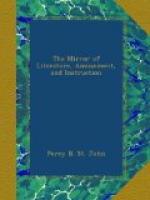“These animals are fed morning and evening at the door of the house, with a good mess of Indian corn, boiled with water; while they eat, they are milked, and when the operation is completed the milk-pail and the meal-tub retreat into the dwelling, leaving the republican cow to walk away, to take her pleasure on the hills, or in the gutters, as may suit her fancy best. They generally return very regularly to give and take the morning and evening meal; though it more than once happened to us, before we were supplied by a regular milk cart, to have our jug sent home empty, with the sad news that ’the cow was not come home, and it was too late to look for her to breakfast now.’ Once, I remember, the good woman told us that she had overslept herself, and that the cow had come and gone again, ’not liking, I expect, to hanker about by herself for nothing, poor thing.’”
Health of Cincinnati.
“A gentleman told us, that when a medical man intended settling in a new situation, he always, if he knew his business, walked through the streets at night, before he decided. If he saw the dismal twinkle of the watch-light from many windows he might be sure that disease was busy, and that the ‘location’ might suit him well.”
Marketing.
“It is the custom for the gentlemen to go to market at Cincinnati; the smartest men in the place, and those of the ‘highest standing’ do not scruple to leave their beds with the sun, six days in the week, and, prepared with a mighty basket, to sally forth in search of meat, butter, eggs, and vegetables. I have continually seen them returning, with their weighty basket on one arm and an enormous ham depending from the other.”
Moving Houses.
“One of the sights to stare at in America is that of houses moving from place to place. We were often amused by watching this exhibition of mechanical skill in the streets. They make no difficulty of moving dwellings from one part of the town to another. Those I saw travelling were all of them frame-houses, that is, built wholly of wood, except the chimneys; but it is said that brick buildings are sometimes treated in the same manner. The largest dwelling that I saw in motion was one containing two stories of four rooms each; forty oxen were yoked to it. The first few yards brought down the two stacks of chimneys, but it afterwards went on well. The great difficulties were the first getting it in motion and the stopping exactly in the right place. This locomotive power was extremely convenient at Cincinnati, as the constant improvements going on there made it often desirable to change a wooden dwelling for one of brick; and whenever this happened, we were sure to see the ex No. 100 of Main-street or the ex No. 55 of Second-street creeping quietly out of town, to take possession of a humble suburban station on the common above it.”
Social distinctions.




